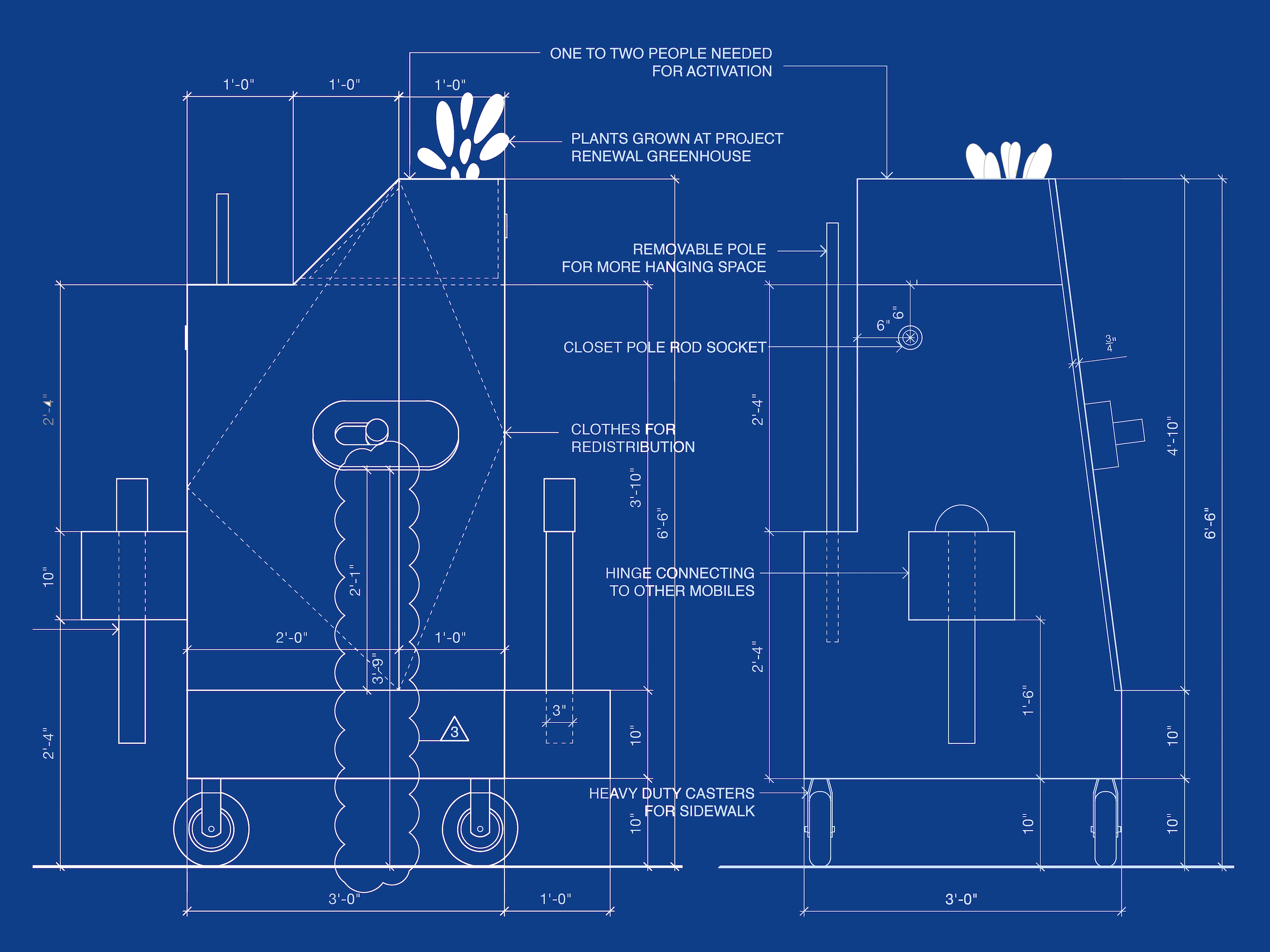Collective Mobilities
February 3 – March 9, 2025 1:00 PM – 5:00 PM
DeKalb Gallery 331 Dekalb Ave, Brooklyn, NY 11205

A Critical Conversations Event
Collective Mobilities
Alex Strada
DeKalb Gallery
February 3-March 9, 2025
Hours: Monday, Wednesday, and Saturday 1-5pm or by appointment (please email Alex: astrada@pratt.edu)
Soft opening: Monday, February 3rd, 1-5pm
Please come to explore the exhibition and drop off lightly worn clothes or any essentials outlined below. Refreshments will be served.
Collective Mobilities is a collaborative exhibition that centers on redistribution and mutual aid to support Pratt’s neighbors experiencing homelessness. The project was conceived and organized by multidisciplinary artist Alex Strada, the Public Artist in Residence with the NYC Department of Homeless Services and Department of Cultural Affairs, and Fine Arts Civic Engagement Fellow at Pratt. Homelessness is often stigmatized and framed as a problem to be solved by city agencies alone. This exhibition challenges that perspective, emphasizing the shared responsibility of New Yorkers to address homelessness amidst the rampant dehumanization of people dealing with housing insecurity, including asylum seekers. By forging partnerships among students, mutual aid groups, city workers, and researchers, Collective Mobilities demonstrates the transformative potential of creative, community-driven care.
At the core of the exhibition are the Mutual Aid Mobile sculptures, which Strada designed with architect Ekin Bilal and were fabricated by Yasu Izaki using Pratt’s Fine Arts woodshop. Throughout the duration of the exhibition, the Pratt community is invited to donate clean and lightly used clothing and other essential items. Strada will work with students and volunteers to wheel these portable sculptures loaded with these items to an existing mutual aid network nearby campus for direct distribution.
When displayed in the gallery, the mobiles will be adorned with plants cultivated by participants in the horticultural therapy program at Project Renewal’s Recovery Center, located at the 3rd Street Men’s Shelter in Manhattan. The program is grounded in principles of harm reduction. The plants will be available for sale, with all proceeds going directly to support recreational activities chosen collectively by the program participants.
Lining the walls of the exhibition are maps conveying critical information for understanding homelessness in relation to housing inequities, NIMBYism, and the unequal distribution of shelters across the boroughs despite New York City’s Right to Shelter law. Strada worked with School of Information Associate Professor John Lauerman and graduate assistants Yuanhao Wu and Nathan Smash to synthesize this open source data. The 2D maps on view were co-designed by Strada and Bilal so that the palette of the maps mirror the Mutual Aid Mobiles, situating data as inextricably linked to action. GIS iterations of these maps are available online so this information continues to be accessible outside the gallery and beyond the length of the exhibition.
From October-December 2024, Strada’s Studio in Social Practice class collaborated with the Auburn Family Residence, an NYC Department of Homeless Services shelter nearby campus. Class participants include BFA students Jackson Ebbin, Ayla Ellenbogen, Semoi Khan, Zander McKenzie, and MFA students Eric Geithner and William Kim. Through a series of workshops, these students skill-shared with their neighbors leading lessons in material exploration using cyanotype, collage, color-mixing, and drawing. The monitor depicts the experimental, playful works produced during these sessions. The hand stitched cyanotype on view was made collectively by Auburn residents and the Social Practice students using upcycled fabric scraps from B&J Fabrics. Upon the closing of Collective Mobilities, this fiber artwork will be brought to Auburn where it will be permanently displayed.
This project is generously supported by the Pratt Institute, the National Science Foundation, Materials for the Arts, and B&J Fabrics.
Items Needed for Redistribution:
Throughout the exhibition, we will be collecting the following lightly used items that are cleaned prior to drop off:
- Clothing for all ages and genders (including infants)**
- Shoes
- Tote bags
- Backpacks
- Suitcases
- Hats
- Gloves
- Scarves
- Reusable water bottles / coffee cups / baby bottles
- Strollers
- Toys/Games
We also need new, unused essentials, including:
- Unopened food (in keeping with Pratt policy, food must be sealed)
- Toothpaste
- Toothbrushes
- Shampoo and conditioner
- Soap
- Deodorant
- Body lotion
- Tampons and pads
- Diapers
- Socks
- Underwear
All items can be brought directly to the gallery during open hours beginning February 3rd.
To Participate:
Please join us every Saturday from 2-4:30pm beginning February 8th for activation of the mobile sculptures. We will meet at the Dekalb Gallery at 2pm to load the sculptures with donated items and bring them to Hall Street.
Please email Alex Strada (astrada@pratt.edu) with any questions or with a request to activate the mobiles another day.
Related Reading List
adrienne marie brown, Emergent Strategies
Coalition for the Homeless, “Myths and Facts”.
Aruna D’Souza, Imperfect Solidarities
Matthew Desmond, Evicted: Poverty and Profit in the American City
Matthew Desmond, Poverty, By America
Rosalyn Deutsche, Evictions: Art and Spatial Politics
Tom Finkelpearl, What We Made: Conversations on Art and Social Cooperation
Pablo Helguera, Education for Socially Engaged Art
bell hooks, Teaching to Transgress
Henri Lefebvre, The Production of Space
Bettina M. Love, We Want to Do More Than Survive
Thomas J. Main, Homelessness in New York City: Policymaking from Koch to de Blasio
David J. Madden and Peter Marcuse, In Defense of Housing
Fred Moten and Stefano Harney, The Undercommons: Fugitive Planning & Black Study
Leah Lakshmi Piepzna-Samarasinha, Care Work: Dreaming Disability Justice
Martha Rosler, If You Lived Here: The City in Art, Theory and Social Activism
Robert Rosenberger, Callous Objects: Designs Against the Homeless
Sarah Schulman, Gentrification of the Mind
Dean Spade, Mutual Aid: Building Solidarity During This Crisis (and the Next)
Alex Strada, “The Right to Shelter”, On the Ground: Reader
This event is part of Critical Conversations: creating space for and educating one another about our multiple cultural contexts, activism, civil discourse, and academic engagement.